What if we pick the olives for the farmers?”, he asked as they sat in the Beit-Sahour cafe over a plate of hummus and pita.
“You’d get shot!”, she said with surprise and caution in her voice.
He conceded to her point, but remained disturbed by his memories. That morning he had walked through an olive grove nestled in a valley outside Bethlehem. As the trees parted in front of him, he reached an impasse. Scoured through the valley lay a fence as far as the eye could see.
Fences are, of course, few and far between in the cultivated hill country of Palestine, and this one in particular, seemed very much out of place. So much so, he thought, it seemed likely that the land had never seen one like this before; and neither had he. For this was not just one fence, but three, with a road burned through the middle.
He wondered what place such an obstacle had dividing the valley so boldly. If someone did not want the farmers to access their fields, that someone had surely succeeded. The barriers began just in front of him with heaping coils of razor wire. Behind that lay open ground which ended against a high chain-link fence which was also lined with more razor wire on top. Just beyond that fence stood a fence similar the previous, but with the added “security” of exposed high voltage wire strung across it like something out of Jurassic Park. Past this was a road way, buffeted on either side by raked sand. This was prepared, he concluded, so as to catch the slightest inconsistency of an intruding footprint or evidence any un-groomed impression in its surface.
Another fence provided a bookend for the ghastly production on the opposite side of the road. It’s height and wire, dwarfed by the previous lines of defence, clearly revealed which side of the fence was meant to be “secured,” and he was on it.
Beyond the snaking concentric lines of the barrier, the olive trees, many older that any living man or woman could possibly remember, stood silent. The soil beneath them, rich from years without harvest and the branches above, laden with their ripening burden of perseverance.
They were finished the meal and as they got up to leave he thought to himself, “there must be a way.” Those weren’t even his trees and fields. The land meant little to him as a means of income or for supporting a family as it did for the farmers who owned it, yet he felt the waves of helplessness and dispare as if it did. He wished his memories were only memories and not the daily reality for Palestinians. Tragically though, they are real memories, real trees, real fences, real bullets, and real men, women, and children.
Ben Davies

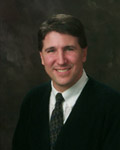 Former Vice President of National Penn Insurance, Phil Swartley, has been named as the new principal of Quakertown (PA) Christian School.
Former Vice President of National Penn Insurance, Phil Swartley, has been named as the new principal of Quakertown (PA) Christian School.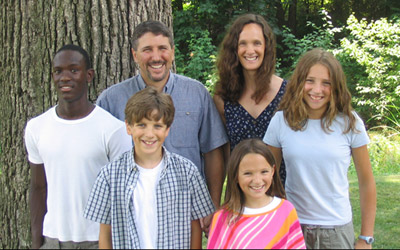 The idea of Christ-centered education is of utmost importance to Swartley. “[The school] is a family that loves each other and God. We work to help each parent raise their children in a confusing and often difficult world. The emphasis on teaching from God’s word is evident from our science curriculum through our commitment to teaching a Bible class every day, all year.”
The idea of Christ-centered education is of utmost importance to Swartley. “[The school] is a family that loves each other and God. We work to help each parent raise their children in a confusing and often difficult world. The emphasis on teaching from God’s word is evident from our science curriculum through our commitment to teaching a Bible class every day, all year.”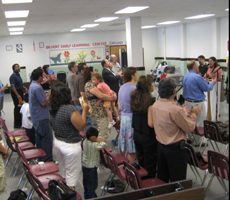 As is evident throughout our culture, fast-paced American society is obsessed with getting the job done. Once work is finished we can enjoy some time of relaxation and socialization. Until then, though, we work hard to complete the task at hand without interruptions. We’ll follow the printed schedule without many deviations or spontaneity. While there is something positive to be said about the perseverance mentality, are we really getting the most out of life when we put our work before other important aspects of life, like relationships?
As is evident throughout our culture, fast-paced American society is obsessed with getting the job done. Once work is finished we can enjoy some time of relaxation and socialization. Until then, though, we work hard to complete the task at hand without interruptions. We’ll follow the printed schedule without many deviations or spontaneity. While there is something positive to be said about the perseverance mentality, are we really getting the most out of life when we put our work before other important aspects of life, like relationships?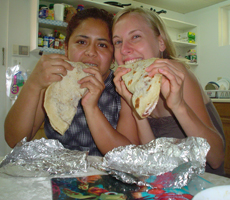 This leisure helps put life in perspective for me. It’s also a stark contrast to the way I have operated. I enjoy finishing a task once I start it, I like punctuality, and appreciate having a plan and schedule for what the week will hold. Needless to say, this internship has been a learning experience for me in a whole variety of ways. Ever since my first day, I have observed that around Nueva Esperanza/New Hope, we just kind of go with the flow—with the slow, trickling current, lingering in each place seemingly much longer than necessary. This difference is helping me to reprioritize, and to act to it. Relationships are really what is most important in life.
This leisure helps put life in perspective for me. It’s also a stark contrast to the way I have operated. I enjoy finishing a task once I start it, I like punctuality, and appreciate having a plan and schedule for what the week will hold. Needless to say, this internship has been a learning experience for me in a whole variety of ways. Ever since my first day, I have observed that around Nueva Esperanza/New Hope, we just kind of go with the flow—with the slow, trickling current, lingering in each place seemingly much longer than necessary. This difference is helping me to reprioritize, and to act to it. Relationships are really what is most important in life.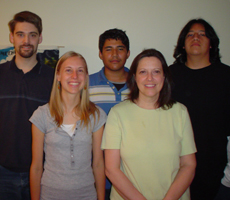 My experience at Nueva Esperanza/New Hope in Suburban Washington, DC, therefore, is one of learning, surprise, and adventure. The upcoming events and gatherings almost always hold a certain amount of ambiguity, and the schedule is largely unpredictable, changing daily. But certain things stay the same: the emphasis on relationships, the time spent with one another, the desire to live in the moment. I hope to take with me this practice of striving to enjoy the present moment, placing greater value on the cultivation of relationships. We learn and grow and experience new things in talking with another. Let us not grow so focused on ourselves that we forget to spend time doing what is most important in life and truly living.
My experience at Nueva Esperanza/New Hope in Suburban Washington, DC, therefore, is one of learning, surprise, and adventure. The upcoming events and gatherings almost always hold a certain amount of ambiguity, and the schedule is largely unpredictable, changing daily. But certain things stay the same: the emphasis on relationships, the time spent with one another, the desire to live in the moment. I hope to take with me this practice of striving to enjoy the present moment, placing greater value on the cultivation of relationships. We learn and grow and experience new things in talking with another. Let us not grow so focused on ourselves that we forget to spend time doing what is most important in life and truly living. Our team is drawing closer to each other. Yesterday after work we dined at the apartment of our new friends Janelle Zook and Bethany Rieff. Bethany made incredibly good lasagna and apple pie. During the dinner preparation Dave arranged a video conference call to the Franconia Conference Office. This call, though it was short and tough to hear what people were saying, really affected me. As I saw many of the conference leaders huddled around the computer wtih funny expressions on their faces, I felt something. It was hard to pinpoint. I had one of those moments that I knew would stick in my mind for eternity.
Our team is drawing closer to each other. Yesterday after work we dined at the apartment of our new friends Janelle Zook and Bethany Rieff. Bethany made incredibly good lasagna and apple pie. During the dinner preparation Dave arranged a video conference call to the Franconia Conference Office. This call, though it was short and tough to hear what people were saying, really affected me. As I saw many of the conference leaders huddled around the computer wtih funny expressions on their faces, I felt something. It was hard to pinpoint. I had one of those moments that I knew would stick in my mind for eternity. This place is not as foreign or inhospitable as people imagine it to be. In the midst of doing my laundry in a bucket I realized that it is possible to live without a permanent address. Jesus did this, and he challenged others to do this. Taking his words seriously is tough, but not impossible. I would like to thank everyone for your prayers.
This place is not as foreign or inhospitable as people imagine it to be. In the midst of doing my laundry in a bucket I realized that it is possible to live without a permanent address. Jesus did this, and he challenged others to do this. Taking his words seriously is tough, but not impossible. I would like to thank everyone for your prayers.